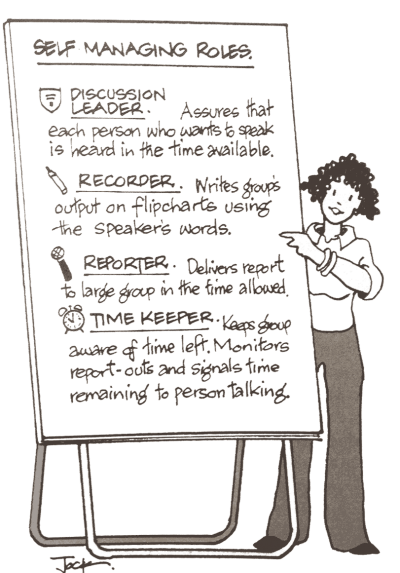Difference between revisions of "Small group self-management roles"
Jump to navigation
Jump to search
(Goal = have a group take ownership for the meeting, its outcomes, and their future) |
m (Sources += {{djdsst}}) |
||
| (One intermediate revision by the same user not shown) | |||
| Line 1: | Line 1: | ||
{{Oyster | {{Oyster | ||
|goal=have a group take | |goal=have a group take responsibility for themselves | ||
|stage=Sparkle | |stage=Sparkle | ||
|theme=Don’t just do something | |theme=Don’t just do something | ||
| Line 10: | Line 10: | ||
|therefore full=Show the self-managing roles—leader, timer, decoder, and reporter—and invite everyone to take the responsibility for themselves. | |therefore full=Show the self-managing roles—leader, timer, decoder, and reporter—and invite everyone to take the responsibility for themselves. | ||
}} | }} | ||
==Sources== | |||
*{{djdsst}} | |||
Latest revision as of 10:46, 5 April 2014
…small groups of eight or so individuals.
✣ ✣ ✣
Self-managing groups allow you to focus on and lead the whole.
Therefore:
Show the self-managing roles—leader, timer, decoder, and reporter—and invite everyone to take the responsibility for themselves.
✣ ✣ ✣
✣ ✣ ✣
Sources
- Don’t just do something, stand there!—Ten Principles for Leading Meetings That Matter by Marvin Weisbord, Sandra Janoff
